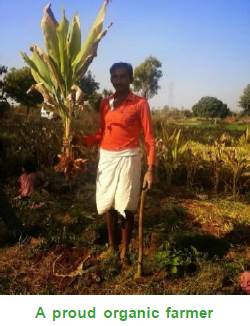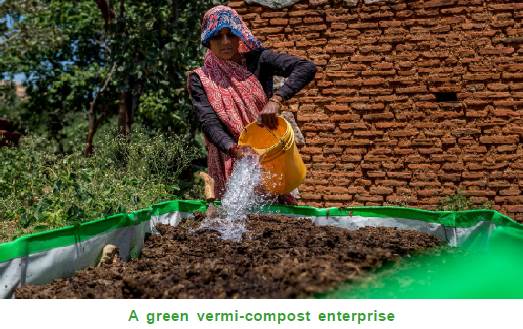|
Vermi –
Composting:
A griculture is the primary occupation of 72% of India’s population. Organic farming is the key to achieving sustainability in agriculture. Use of organic composting and high quality seeds helps to improve soil quality and increase crop productivity as well. Vermi-composting is one of the most important co mponents of organic farming and a remunerative
enterprise for the farmers. mponents of organic farming and a remunerative
enterprise for the farmers.
Development Alternatives has been promoting of low cost technology of Tetra Vermi Bed for making vermi-compost thereby helping farmers in the poverty stricken region of Bundelkhand create wealth from waste. These beds are low cost, require very little space and produce good quality organic manure which can be used anywhere from the farm lands to nurseries and even private gardens. This initiative has been introduced under the NABARD supported ‘Farmers’ Producer Organisations’ project to alleviate their economic condition by helping them increase their farm productivity. The main objectives of this initiative are as follows: • Enhance organic farming and increase farm productivity by enabling farmers to access organic compost and high quality seeds. • Enhance efficiency of farmers to get better economic deals and thereby increase their income levels. • Improve marketing infrastructure to reduce transaction and transportation costs. In the villages, women are usually involved in
activities of animal husbandry during their daily work. So, running a vermi-composting unit becomes a complementary activity transforming
their daily non-paying work into a profit making green enterprise. This
can be done by making interventions at various points in the business
that include: Capacity Building and Finance: Under the project, more than 1000 farmers have been associated with seed and vermi-compost production. These farmers have been given training to increase their scientific and technical knowledge for improving soil fertility and increasing farm productivity. Development Alternatives endeavours to develop the capacities of small and marginal farmers for sustainable farming thereby providing them livelihood security. This capacity building programme is also developing strategies that will enable farmers to establish linkages with formal and non-formal institutions in the areas of credit, trade, markets and skill development. Technology: This project is also giving technical support to the farmers to promote organic composting. Institutions: The thematic initiative will help in building the capacities of participating producers, NSOs, PNGOs and SHGs through training and handholding in the field. These institutional partners will be trained and supported to adopt improved organic farming practices that are resource efficient, boost productivity and yield environment co-benefits in the short and the long run. All the above interventions will create an opportunity for value addition centres for agri-businesses in Bundelkhand which in turn will help revive the rural economy of this poverty stricken region. q Omkar Gupta
|
